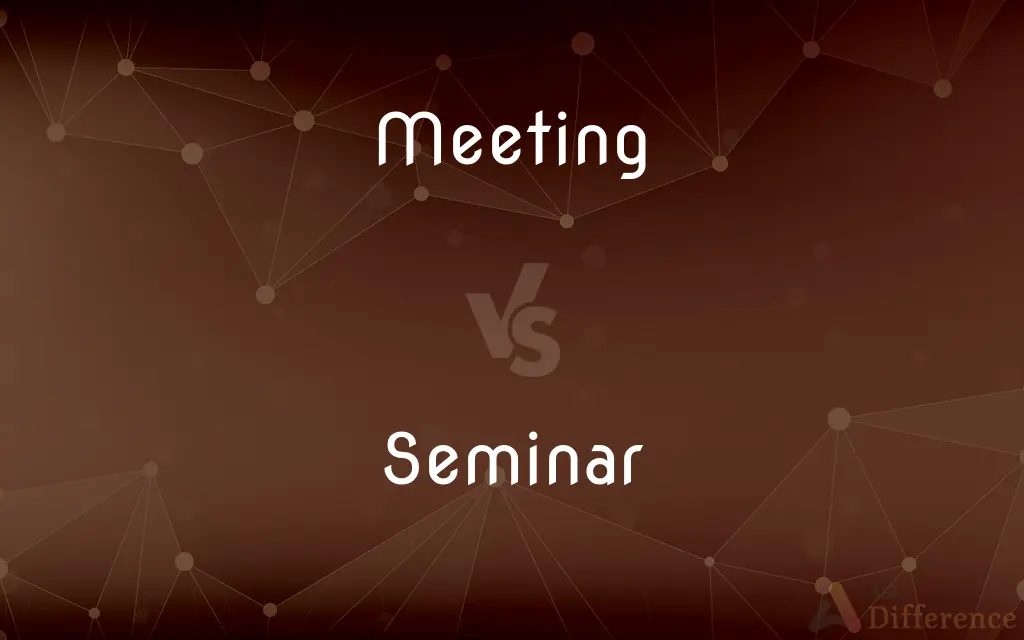Meeting vs. Seminar — What's the Difference?
By Tayyaba Rehman & Urooj Arif — Updated on April 6, 2024
A meeting is a gathering of individuals to discuss specific topics or issues, often with a collaborative goal, while a seminar is a form of academic instruction, either at an academic institution or offered by a professional organization.

Difference Between Meeting and Seminar
Table of Contents
ADVERTISEMENT
Key Differences
Meetings are typically characterized by their focus on discussion, decision-making, or information sharing among a group of people with a specific agenda. They can vary in formality, size, and purpose, ranging from daily team check-ins to formal corporate strategy sessions. Seminars, however, are educational sessions conducted by an expert or a group of experts, focusing on a specific subject or field of study. They are designed to provide in-depth information, instruction, or training to the attendees, often involving presentations, lectures, and sometimes interactive discussions.
The primary purpose of a meeting is to facilitate communication and collaboration among team members, stakeholders, or clients, aiming to reach a consensus, make decisions, or exchange information. In contrast, the goal of a seminar is educational, aiming to enhance the knowledge or skills of the participants regarding a particular topic. Seminars are often more structured than meetings, with a defined curriculum or set of topics to be covered, and they may include various teaching methods such as workshops, lectures, and Q&A sessions.
Meetings can be a regular occurrence within an organization, serving as a tool for ongoing project management, team coordination, or operational discussions. Seminars, on the other hand, tend to be less frequent, organized around specific educational opportunities, professional development, or the introduction of new concepts and techniques within a field. They may also serve as a platform for networking and professional exchange among participants.
While meetings can involve participants from within a single organization or include external parties for specific discussions, seminars typically attract a broader audience interested in the seminar's subject matter. This audience may include professionals from various organizations, students, or anyone seeking to gain insights into the topic being presented.
The outcomes of meetings and seminars also differ; meetings aim to produce actionable items, decisions, or shared understandings among the participants, while seminars aim to impart knowledge, stimulate intellectual engagement, and possibly certify the completion of a certain level of training or understanding of the subject matter.
ADVERTISEMENT
Comparison Chart
Purpose
To discuss, decide, or collaborate on specific topics.
To educate or train participants on a specific topic.
Format
Can be formal or informal, varies in size.
Usually structured, involving lectures, workshops.
Frequency
Can be a regular occurrence within an organization.
Less frequent, organized around specific opportunities.
Participants
Team members, stakeholders, clients.
Professionals, students, anyone interested in the topic.
Outcome
Decisions, actionable items, shared understandings.
Enhanced knowledge, intellectual engagement, certifications.
Compare with Definitions
Meeting
Can be a regular check-in within teams.
We have weekly meetings to discuss our progress and challenges.
Seminar
An educational session focusing on a specific topic.
The seminar on digital marketing trends attracted many professionals.
Meeting
A gathering for discussion and decision-making.
The team held a meeting to finalize the project timeline.
Seminar
Can include interactive discussions and workshops.
Participants engaged in workshops during the two-day seminar.
Meeting
Aims to produce actionable outcomes.
By the end of the meeting, we had assigned tasks to each team member.
Seminar
Serves as a platform for professional networking.
Many attendees used the seminar as an opportunity to connect with peers in their field.
Meeting
Varies in formality and size.
The emergency meeting was called with a small group to address the sudden issue.
Seminar
Often involves lectures by experts.
The seminar featured a lecture by a renowned scientist on climate change.
Meeting
Involves collaboration and information sharing.
During the meeting, various solutions to the problem were proposed and debated.
Seminar
Designed to enhance knowledge or skills.
The seminar provided in-depth training on the latest software tools.
Meeting
A meeting is when two or more people come together to discuss one or more topics, often in a formal or business setting, but meetings also occur in a variety of other environments. Many various types of meetings exist.
Seminar
A seminar is a form of academic instruction, either at an academic institution or offered by a commercial or professional organization. It has the function of bringing together small groups for recurring meetings, focusing each time on some particular subject, in which everyone present is requested to participate.
Meeting
The act or process or an instance of coming together; an encounter.
Seminar
A course of study for a small group of students in a college or graduate school, often entailing research under the guidance of a professor.
Meeting
An assembly or gathering of people, as for a business, social, or religious purpose.
Seminar
The group of students in such a course.
Meeting
The act of persons or things that meet.
Meeting him will be exciting.
I enjoy meeting new people.
Seminar
A scheduled meeting of such a group.
Meeting
A gathering of persons for a purpose; an assembly.
We need to have a meeting about that soon.
Seminar
A meeting for an exchange of ideas; a conference.
Meeting
(collective) The people at such a gathering.
What has the meeting decided.
Seminar
A class held for advanced studies in which students meet regularly to discuss original research, under the guidance of a professor.
Meeting
An encounter between people, even accidental.
They came together in a chance meeting on the way home from work.
Seminar
A meeting held for the exchange of useful information by members of a common business community.
Meeting
A place or instance of junction or intersection; a confluence.
Earthquakes occur at the meeting of tectonic plates.
Seminar
A group of students engaged, under the guidance of an instructor, in original research in a particular line of study, and in the exposition of the results by theses, lectures, etc.; - formerly called also seminary, now seldom used in this sense.
Meeting
A religious service held by a charismatic preacher in small towns in the United States.
Seminar
Any meeting for an exchange of ideas
Meeting
(Quakerism) An administrative unit in the Religious Society of Friends (Quakers).
Denver meeting is a part of Intermountain yearly meeting.
Seminar
A course offered for a small group of advanced students
Meeting
Present participle of meet
Meeting
A coming together; an assembling; as, the meeting of Congress.
Meeting
A junction, crossing, or union; as, the meeting of the roads or of two rivers.
Meeting
A congregation; a collection of people; a convention; as, a large meeting; an harmonious meeting.
Meeting
An assembly for worship; as, to attend meeting on Sunday; - in England, applied distinctively and disparagingly to the worshiping assemblies of Dissenters.
Meeting
A formally arranged gathering;
Next year the meeting will be in Chicago
The meeting elected a chairperson
Meeting
The social act of assembling for some common purpose;
His meeting with the salesmen was the high point of his day
Meeting
A small informal social gathering;
There was an informal meeting in my livingroom
Meeting
A casual or unexpected convergence;
He still remembers their meeting in Paris
There was a brief encounter in the hallway
Meeting
The act of joining together as one;
The merging of the two groups occurred quickly
There was no meeting of minds
Meeting
A place where things merge or flow together (especially rivers);
Pittsburgh is located at the confluence of the Allegheny and Monongahela rivers
Common Curiosities
What is the main difference between a meeting and a seminar?
The main difference lies in their purpose: meetings focus on discussion and decision-making, while seminars are designed for education and training on specific topics.
How do participants in meetings and seminars differ?
Meeting participants usually have a direct stake in the discussion topics, such as team members or stakeholders, while seminar participants are generally interested in the seminar's subject matter for learning or professional development.
Are seminars only held in academic settings?
No, seminars can be organized by academic institutions, professional organizations, or companies, catering to both educational and professional development needs.
Is attendance at seminars and meetings compulsory?
Attendance can vary; meetings often require attendance from specific individuals or teams, whereas seminars may be optional, depending on the interest in the topic.
Can a seminar include discussions like a meeting?
Yes, seminars can include interactive discussions, Q&A sessions, and workshops, although these are structured around educational content.
Can the format of meetings and seminars be similar?
While both can involve presentations and discussions, seminars are more structured towards teaching and may employ a wider range of educational methods.
Do meetings always result in decisions?
While not all meetings result in immediate decisions, they aim to facilitate collaboration, information exchange, and progress towards actionable outcomes.
How do the outcomes of meetings and seminars differ?
Meetings aim for decisions or actionable items related to specific projects or topics, while seminars seek to enhance participants' knowledge or skills on a broader subject.
Can meetings and seminars be held virtually?
Yes, both meetings and seminars can be conducted virtually, especially with the rise of digital communication platforms.
Are seminars more formal than meetings?
Seminars are generally more structured and may appear more formal due to their educational nature, but meetings can also be formal depending on the organizational context.
Share Your Discovery

Previous Comparison
Pump vs. Turbine
Next Comparison
Pie vs. TartAuthor Spotlight
Written by
Tayyaba RehmanTayyaba Rehman is a distinguished writer, currently serving as a primary contributor to askdifference.com. As a researcher in semantics and etymology, Tayyaba's passion for the complexity of languages and their distinctions has found a perfect home on the platform. Tayyaba delves into the intricacies of language, distinguishing between commonly confused words and phrases, thereby providing clarity for readers worldwide.
Co-written by
Urooj ArifUrooj is a skilled content writer at Ask Difference, known for her exceptional ability to simplify complex topics into engaging and informative content. With a passion for research and a flair for clear, concise writing, she consistently delivers articles that resonate with our diverse audience.














































